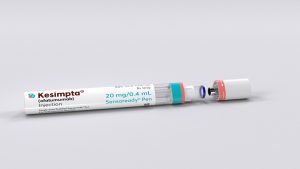Progressive MS Trial of Kesimpta Not on Horizon, But Other Possibilities in Works
Written by |

Novartis is not planning to open a clinical trial of Kesimpta (ofatumumab) as a potential treatment for primary progressive multiple sclerosis (PPMS) anytime soon, a company executive said. But it is well aware of the “unmet need” for therapy options among this patient group, and is exploring avenues.
“We do recognize there is unmet need with PPMS patients, who make up close to 10% of the MS patient population,” Dharmesh Patel, MD, vice president, medical unit head of neuroscience at Novartis, said in an interview with MS News Today in August, shortly after Kesimpta’s U.S. approval.
“The life-cycle management plans for Kesimpta are still evolving,” Patel added. “We have a strong and long history of bringing new medications for patients with neurological diseases for the last 75 years. We are always evaluating the current unmet needs … and looking at safety and Kesimpta’s place in a future portfolio.”

Kesimpta, by Novartis, an injection treatment for relapsing MS.
He urged patients to “stay tuned,” side-stepping questions directly addressing PPMS and Kesimpta — an anti-CD20 monoclonal antibody treatment targeting select B-cells, and as such one with similarities to Ocrevus (ocrelizumab, by Genentech), the only disease-modifying therapy for PPMS approved in the U.S. and Europe.
“We have a pipeline, but some of this information is not yet in the public domain,” Patel said. “We are evaluating other options [to Kesimpta] as well, including those targeting PPMS patients.”
Kesimpta is believed to work by destroying B-cells, immune system cells that drive inflammation in MS. It is indicated for people with all forms of relapsing multiple sclerosis (MS): clinically isolated syndrome (CIS), relapsing-remitting MS (RRMS), and active secondary progressive MS (SPMS).
Ocrevus is also approved for relapsing MS, with its clinical trials having shown effectiveness in both primary progressive and relapsing patients.
More research is needed in progressive disease, said Gabriel Pardo, MD, director of the Oklahoma Medical Research Foundation Multiple Sclerosis Center of Excellence who took part in Kesimpta’s pivotal trials.
“We now have to some extent ‘conquered’ relapsing MS through the development of highly efficacious medications, [and] we rightly should turn attention to progressive MS,” he said.
Pardo “absolutely” would welcome a future PPMS study of Kesimpta, an at-home injection therapy unlike Ocrevus, an infusion treatment. But he knows the decision is not his, and he is not privy to all the factors that need go into launching a major clinical trial.
Still, “there is no doubt that the progressive MS population lacks the treatment options that we have for relapsing disease,” Pardo said. “We only have one option that has been clinically proven to be effective in primary progressive MS. That certainly deserves more research.”
The potential for future therapy options likely demands a better understanding of how to move beyond controlling inflammation, he added.
An ‘insidious’ disease
Part of the reason for the discrepancy in treatments open to PPMS patients, relative to those with relapsing MS, comes down to the underlying biology that causes each form of the disease.
Relapsing MS is thought to be driven in large part by inflammation, through mechanisms that are fairly well studied. PPMS, conversely, is usually characterized less by inflammation and more by neurodegeneration — the destruction and death of nerve cells. But the mechanisms behind such loss are not completely understood.

Gabriel Pardo, a neurologist and director of the nonprofit research center OMRF. (Courtesy of Dr. Pardo)
“Progressive disease is more insidious, a slow and continuous worsening of symptoms. And that in itself is something that we do not fully understand how it’s taking place,” Pardo said. “Whether it’s a consequence of early inflammatory activity, with a secondary, slow withering of the pathways for the nerve cells — or whether it’s a primary process with a superimposed inflammatory activity — we have not sorted that out, quite honestly.”
As a result, “the medications that we know and have gone through the development process are those based on what we know of inflammatory disease,” he added. “And it stands to reason that they are evaluated initially in that patient segment of relapsing MS.”
While Ocrevus, like Kesimpta, works by limiting inflammation, it also showed efficacy in PPMS patients to demonstrate that targeting inflammation can be of some benefit in progressive disease.
However, its effectiveness for those with primary progressive disease is generally less impressive than that seen in people with relapsing forms of MS.
“The effects on progression for all of the medications that we have evaluated in the progressive stages and its parameters is of modest benefit,” Pardo said. “It’s not as effective as we would like. We take that modest benefit, but it’s clearly something we need to improve on.”
Pardo believes that finding a more effective treatment for PPMS patients — and a way of bettering care for all with MS — will ultimately require medications that act on targets other than inflammation. MS is characterized by demyelination, the loss of myelin — a sheath-like wrapping around nerve fibers that helps them to fire electrical signals efficiently.
“Myelin in itself can be repaired, the cells in the CNS [central nervous system; brain and spinal cord] responsible for creating myelin around nerve cells have the capacity for regenerating themselves and generating myelin,” Pardo said. “That is a natural process. But in many cases it’s an incomplete process, and that’s how we start accumulating disability in patients.”
When myelin is not being repaired properly, because demyelination is significant or persistent, “then we also lose nerve cells … and nerve cells do not repair themselves. Then we have absolute and permanent damage.”
Remyelination a next frontier?
Pardo sees the ability to promote the myelin regeneration (remyelination), or the regeneration of nerve cells themselves, as future approaches for MS treatment.
“The ability to repair either myelin or nerve cells is the next target, the next frontier,” he said. “It’s something that’s being evaluated, there are multiple approaches going on right now. Some of them have fairly good support from animal models, and we’re excited about them.”
Pardo specifically highlighted three potential remyelinating therapies currently in clinical development.
They are: opicinumab, by Biogen, now in a Phase 2 relapsing MS clinical trial (NCT03222973); elezanumab, by AbbVie, also in a Phase 2 study (NCT03737851) in relapsing patients, and a Phase 2 study (NCT03737812) in primary progressive and non-active secondary progressive patients; and clemastine, an antihistamine already examined in one Phase 2 relapsing MS trial (NCT02040298) and now being studied in another (NCT02521311) in people with acute optic neuritis.
While he knows more rigorous clinical testing, like Phase 3 trials, are still needed to better understand their likely efficacy and safety, he considers a remyelinating or repairing MS therapy a not-so-distant possibility.
“With the speed of which these things have been developing, I think it’s not out of the question to expect something along those lines within the next decade,” Pardo said. “I think that’s feasible.
“Let me put it this way: I hope to see it before my MS career ends, and I’ve another 15 years. So there you go.”


